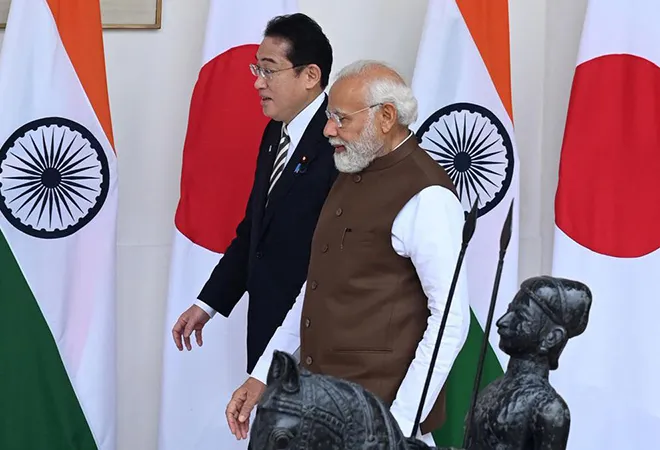The visit by the Japanese Prime Minister, Fumio Kishida, to India, in March 2023, during which he engaged with his Indian counterpart, Narendra Modi, on global and bilateral issues, focused on cooperation between the G-7 and the G-20 (Japan and India hold their presidencies, respectively). Besides this, Mr. Kishida also unveiled “Japan’s New Plan for a Free and Open Indo-Pacific” (FOIP) and exchanged views about deepening the “Japan-India Special Strategic and Global Partnership”.
Japan’s FOIP clearly shows that Japan wants to reinforce the idea that it has been the main champion of the FOIP concept, and Mr. Kishida’s speech underlined that given the current geopolitical landscape with the ongoing Russia-Ukraine war, growing Chinese assertiveness in the South China Sea, East China Sea, the Indian Line of Actual Control and the Taiwan Straits, there is a need to give a fresh push and momentum to this concept. The New Plan for the FOIP lays stress on the need to uphold the rules-based order and respect each other’s territorial sovereignty, with Mr. Kishida warning that “at a time when the international community is at a historical turning point, I would like to clarify the concept of FOIP once again to propose a guiding perspective to be shared by the international community which, if left unchecked, could drift towards division and confrontation”.
Challenges before the Indo-Pacific
Japan’s new policy focuses on the numerous challenges facing the Indo-Pacific such as the Ukraine war, food security, and cyber space in addition to issues such as ensuring the freedom of the seas, and connectivity among others.
The fact that Japan under the FOIP should work alongside other like-minded countries in the region has been mentioned, with India being billed as an ‘indispensable’ partner.
Another challenge which has been highlighted is the lack of a united stand on “what the international order should be” — the differing position of countries on the Russia-Ukraine war has brought this issue to the fore. But there is a firm belief that the FOIP will be able to work with and embrace diverse voices and create an atmosphere of cooperation and collaboration rather than division and confrontation. For attaining this atmosphere of cooperation, ‘rule-making through dialogue’ should be encouraged. The fact that Japan under the FOIP should work alongside other like-minded countries in the region has been mentioned, with India being billed as an ‘indispensable’ partner.
The foundation
There is a realisation that Japan needs to do much more in the region, and towards this, ‘four pillars of cooperation’ under the new FOIP have been outlined: principles for peace and rules for prosperity; addressing challenges in an Indo-Pacific way; multi-layered connectivity; and extending efforts for security and safe use of the “sea” to the “air”.
In the first pillar, it has been pointed out that vulnerable countries usually suffer the most if there is an erosion in the rule of law. Therefore, Japan wants to engage in economic development programmes such as promoting the implementation of the G-20 Principles for “Quality Infrastructure Investment”.
Under the second pillar, Mr. Kishida talked about “expansion of cooperation for the FOIP by incorporating realistic and practical projects in a wide range of areas, such as climate change, food security, global health and cybersecurity”. Japan has been working for long on connectivity projects bilaterally with many countries in the Indo-Pacific region.
Under the third pillar, the three areas identified for introducing more such projects are Southeast Asia, South Asia and the South Pacific/Pacific Island countries. Japan has made a new commitment of $100 million towards the Japan-ASEAN Integration Fund; it will promote the Bay of Bengal-Northeast India industrial value chain concept in cooperation with India and Bangladesh, and the new Palau International Airport Terminal project (an archipelago in the western Pacific Ocean) supported by Japan has also taken off.
Under the third pillar, the three areas identified for introducing more such projects are Southeast Asia, South Asia and the South Pacific/Pacific Island countries.
Under the fourth pillar, Japan will help in strengthening the capabilities of maritime law enforcement agencies in other countries. Towards these objectives, Japan will implement the “strategic use of Official Development Assistance (ODAs)”, revise the Development Cooperation Charter and set forth guidelines for ODA for the next 10 years, and introduce an “offer-type” cooperation and a new framework for “private capital mobilization-type” grant aid. Mr. Kishida also announced that Japan would “mobilize” a total of more than $75 billion in public and private funds in the Indo-Pacific region by 2030 in infrastructure development.
Tokyo’s role
The primary goal of Mr. Kishida’s visit was to reinforce the centrality of Japan in the emerging geopolitics of the Indo-Pacific. In the past, he had stated that “Ukraine today may be East Asia tomorrow”, which shows Japan’s concern about growing Chinese belligerence in the region. Mr. Kishida’s emphasis on the need to uphold a peaceful and a rules-based international order, and his putting forward policies and mechanisms under the new FOIP to help stabilise the regional order amidst the Ukraine war and the differing positions of countries on this conflict goes on to show that Japan is preparing itself for any unforeseen threat to its own as well as regional security. A Japan deeply invested in Indo-Pacific stability and prosperity is good news indeed for India and the wider region.
This commentary originally appeared in The Hindu.
The views expressed above belong to the author(s). ORF research and analyses now available on Telegram! Click here to access our curated content — blogs, longforms and interviews.


